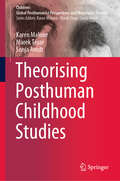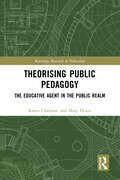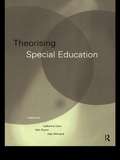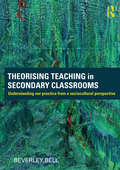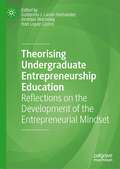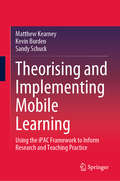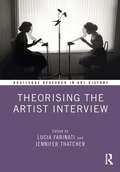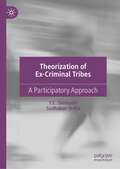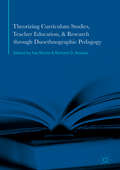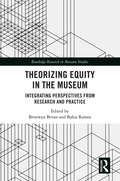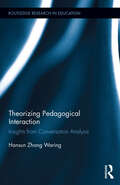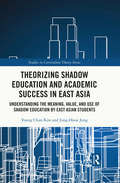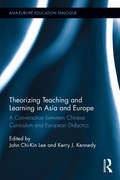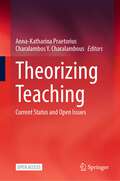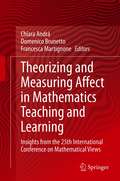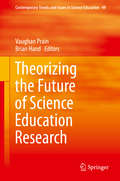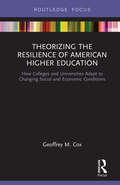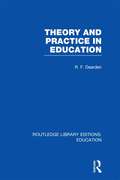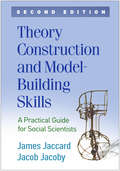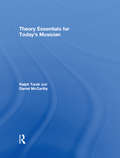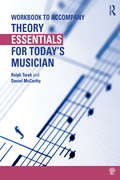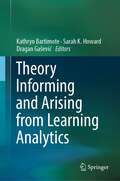- Table View
- List View
Theorising Play in the Early Years
by Marilyn FleerTheorising Play in the Early Years is a theoretical and empirical exploration of the concept of pedagogy and play in early childhood education. The book provides an in-depth examination of classical and contemporary theories of play, with a focus on post-developmental perspectives and Vygotskian theory. In this book, Marilyn Fleer draws on a range of cross-cultural research in order to challenge Western perspectives and to move beyond a universal view of the construct of play. Culture and context are central to the understanding of how play is valued, expressed and used as a pedagogical approach in early childhood education across the international community. Designed as a companion to the textbook Play in the Early Years, but also useful on its own, Theorising Play in the Early Years provides indispensable support to academics and TAFE lecturers in early childhood education in their course development and research.
Theorising Posthuman Childhood Studies (Children: Global Posthumanist Perspectives and Materialist Theories)
by Marek Tesar Karen Malone Sonja ArndtThis book is a genealogical foregrounding and performance of conceptions of children and their childhoods over time. We acknowledge that children’s lives are embedded in worlds both inside and outside of structured schooling or institutional settings, and that this relationality informs how we think about what it means to be a child living and experiencing childhood. The book maps the field by taking up a cross-disciplinary, genealogical niche to offer both an introduction to theoretical underpinnings of emerging theories and concepts, and to provide hands-on examples of how they might play out. This book positions children and their everyday lived childhoods in the Anthropocene and focuses on the interface of children’s being in the everyday spaces and places of contemporary communities and societies. In particular this book examines how the shift towards posthuman and new materialist perspectives continues to challenge dominant developmental, social constructivist and structuralist theoretical approaches in diverse ways, to help us to understand contemporary constructions of childhoods. It recognises that while such dominant approaches have long been shown to limit the complexity of what it means to be a child living in the contemporary world, the traditions of many Eurocentric theories have not addressed the diversity of children’s lives in the majority of countries or in the Global South.
Theorising Public Pedagogy: The Educative Agent in the Public Realm (Routledge Research in Education)
by Mary Dixon Karen CharmanDrawing on the ideas of Hannah Arendt and Michel Foucault, this book extends the theoretical understanding of public pedagogy and brings into sharp focus the elements that constitute the public realm; the site of public pedagogy. Karen Charman and Mary Dixon offer a new theorisation of the public, a term at the heart of debate in the field, heightened in this post-truth era by the COVID-19 pandemic, the rise of fake news and the technological reconfigurations of public life. The new theorization addresses the ‘public’, ‘pedagogy’ and their confluence in ‘public pedagogy’. The book explores a deep engagement with the architecture and dynamics of pedagogy and argues for the positioning of pedagogy with the public. The authors contribute to a theorisation that re-considers the individual and their capacity for agency within the public realm. The book presents knowledge and pedagogical encounters as key elements of public pedagogy and most significantly, the educative agent as a means of critically rethinking social life and learning in public spaces. Presenting an innovative theoretical approach, this book will be of interest to academics in the fields of public and critical pedagogy and postgraduate students in education, cultural studies and politics.
Theorising Special Education
by Catherine Clark Alan Dyson Alan MilThe field of special needs education is well established, and although it continues to develop in exciting and controversial ways, involving some of education's leading thinkers, many people feel it is lacking a coherent theoretical analysis of its own.Students and practitioners, looking for some solid theory to reinforce their own study or practice, commonly have to 'borrow' from other disciplines, such as psychology and sociology, since there has been no attempt to provide a theoretical foundation for the special needs community. This book does exactly that, bringing together contributions from key names in the field from UK and beyond.The book will establish itself as an essential text for students and teachers, as well as all those involved in special needs across the social sciences.
Theorising Teaching in Secondary Classrooms: Understanding our practice from a sociocultural perspective
by Beverley BellTheorising Teaching in Secondary Classrooms is for all teachers who wish to fully understand and improve upon their own practice. It encourages you to reflect on and conceptualise your teaching, and helps you understand how your practice is connected to the social, cultural, political and institutional contexts in which you teach.Considering the la
Theorising Undergraduate Entrepreneurship Education: Reflections on the Development of the Entrepreneurial Mindset
by Andreas Walmsley Guillermo J. Larios-Hernandez Itzel Lopez-CastroThis book engages ongoing debates about the nature, manifestation and purpose of entrepreneurship education (EE). It presents theoretical and practical perspectives on the challenges and opportunities that entrepreneurship educators face globally to equip undergraduate students with entrepreneurial skills, and more generally, develop their entrepreneurial mindsets and capabilities taking advantage of programmes and curricula available in their ecosystem.Divided into three sections, the chapters, written by recognized experts, deliver distinctive approaches to undergraduate EE, an analysis of entrepreneurial mindset-building perspectives, and cases and proposals of undergraduate entrepreneurship programs that go beyond the traditional higher education milieu.This volume provides entrepreneurship educators with a voice to explain how they participate in the topic of entrepreneurship, how undergraduate students engage and respond to EE, and how institutional frameworks for EE, and more generally the entrepreneurship education ecosystem, support undergraduate EE.
Theorising and Implementing Mobile Learning: Using the iPAC Framework to Inform Research and Teaching Practice
by Sandy Schuck Kevin Burden Matthew KearneyThis book focuses on teaching and learning with mobile technologies, with a particular emphasis on school and teacher education contexts. It explains a robust, highly-acclaimed contemporary mobile pedagogical framework (iPAC) that focuses on three distinct mobile pedagogies: personalisation, authenticity and collaboration. The book shows how mobile pedagogical practice can benefit from use of this framework. It offers numerous cutting-edge research resources and examples that supplement theoretical discussions. It considers directions for future research and practice. Readers will gain insights into the potential of current and emerging learning technologies in school and teacher education.
Theorising the Artist Interview (Routledge Research in Art History)
by Lucia Farinati Jennifer ThatcherReflecting on the relationship between artists and their audiences, this book examines how artists have presented themselves publicly through interviews and sought to establish a critical voice for themselves.Considering the interview as a form of cultural production, contributors explore the criteria for determining the artist interview as a distinct field of research in relation to other cultural fields. Structured in four parts, ‘History and Historiography’, ‘Subverting the Biographical Model’, ‘Interviews as Practice’ and ‘Materiality and Technology’, the book takes an interdisciplinary approach that encompasses the fields of art history, fine art, oral history, curating, media studies and museum conservation. By theorising the artist interview as a form of cultural production and embracing it as a co-constructed critical practice, this volume aims to show and encourage an approach to art history which dismantles old hierarchies in favour of valuing dialogue and collaboration.The book will be of interest to scholars working in art history, museum studies, oral history and historiography.
Theorization of Ex-Criminal Tribes: A Participatory Approach
by Sudhakar Yedla Y.C. SimhadriThis book is based on intense research work and consultation conducted over a long period, presents circumstances under which certain tribes in Andhra Pradesh are placed to keep on living through criminal activities. It explains why particular tribes become crime-prone and why and how they have been branded and notified as criminal tribes. It deals with the structure of the village criminal-tribe settlements and approaches the problem of tribal criminology from a structural perspective. It studies the criminal behaviour that could be related to social situations that prevail in the two ex-criminal settlements in Andhra Pradesh and examines the structure and organization of this group as well as changes that have been taking place as far as their criminal activities are concerned. The analysis in this book focuses on the sociological and anthropological circumstances under which the criminal tribes become criminals and continued to be called as criminals although most of them as a group have since stopped criminal activities.
Theorizing Curriculum Studies, Teacher Education, and Research through Duoethnographic Pedagogy
by Joe Norris Richard D. SawyerThis book explores the value of duoethnography to the study of interdisciplinary practice. Illustrating how dialogic and relational forms of research help to facilitate deeply emic, personal, and situated understandings of practice, the editors and contributors promote personal reflexivity and changes in practice. Education, drama, nursing counselling, and art in classroom, university, and larger professional spaces are examined by students, teachers, and practitioners using duoethnography to become more aware, dialogic, imaginative, and relational in their teaching.
Theorizing Equity in the Museum: Integrating Perspectives from Research and Practice (Routledge Research in Museum Studies)
by Bronwyn Bevan and Bahia RamosTheorizing Equity in the Museum integrates the perspectives of learning researchers and museum practitioners to shed light on the deep-seated structures that must be accounted for if the field is to move past aspirations and rhetoric and towards more inclusive practices. Written during a time when museums around the world were being forced to reckon with their institutional practices of exclusion; their histories of colonization, both cultural and intellectual; and, for many, their tenuous business models, the chapters leverage a range of theoretical perspectives to explore lived experiences of working in the museum towards changing the museum. Theories of spatial justice, critical pedagogy, culturally relevant pedagogy, critical race theory, and others are used to consider how the museum’s dominant cultural structures and norms collide with museum professionals’ aspirations for inclusive practices. The chapters present a mix of empirical research and reflections, which collectively operate to theorize the museum as a potential force for enriching, empowering, and transforming an inclusive public’s relationship with some of our most powerful ideas and aspirations. But first they must change, from the inside out. Grounded in practice and practical problems, Theorizing Equity in the Museum demonstrates how theory can be used as a practical tool for change. As a result the book will be of interest to academics and students engaged in the study of museums, education, learning and culture, as well as to museum practitioners with an interest in equity and inclusion.
Theorizing Pedagogical Interaction: Insights from Conversation Analysis (Routledge Research in Education)
by Hansun Zhang WaringPedagogical interaction can be observed through many different landscapes, such as the graduate seminar, the writing skills center, the after-school literacy program, adult ESL classrooms, and post-observation conferences. By viewing these settings through the lens of conversation analysis, this volume lays the groundwork for three principles of pedagogical interaction: competence, complexity, and contingency. The author explores these principles and how they inform what makes a good teacher, how people learn, and why certain pedagogical encounters are more enlightening than others. Drawn from the author’s original research in various pedagogical settings, this volume collects empirical insights from conversation analysis and contributes to theory building. Theorizing Pedagogical Interaction will appeal to students and scholars in applied linguistics, educational linguistics, and communication studies who are interested in the discourse of teaching and learning.
Theorizing Shadow Education and Academic Success in East Asia: Understanding the Meaning, Value, and Use of Shadow Education by East Asian Students (Studies in Curriculum Theory Series)
by Young Chun Kim Jung-Hoon JungThis volume tackles perceived myths surrounding the academic excellence of East Asian students, and moves beyond Western understandings to offer in-depth analysis of the crucial role that shadow education plays in students’ academic success. Featuring a broad range of contributions from countries including Japan, China, Taiwan, and Singapore, chapters draw on rich qualitative research to foreground the lived experiences of students, teachers, and parents in East Asian countries. In doing so, the text provides indigenous insights into the uses, values, and meanings of shadow education and highlights unknown cultural and regional aspects, as well as related phenomena including trans-boundary learning culture, nomadic learning, individualized learning, and the post-schooling era. Ultimately challenging the previously dominating Western perspective around shadow education, the volume offers innovative theorization to highlight shadow education as a phenomenon which cannot be overlooked in discussion of East Asian educational performance, systems, and policy more broadly. Offering pioneering insights into the growing phenomenon of shadow education, this text will benefit researchers, academics, and educators with an interest in international and comparative education, curriculum studies, and East Asian educational practices and policy. Those interested in the sociology of education and educational policy will also benefit from this book.
Theorizing Teaching and Learning in Asia and Europe: A Conversation between Chinese Curriculum and European Didactics (Asia-Europe Education Dialogue)
by Kerry J. Kennedy John Chi-Kin LeeThere has been much debate in recent times between the Anglo American tradition of curriculum studies and the Continental and North European tradition of didactics (Didaktik). As important as such debate has been, this book seeks to add new voices to the debate representing ideas and traditions from a different part of the world. The focus is on Chinese curriculum thinking that has passed through a number of stages and currently represents a blend of some aspects of the American tradition and Chinese cultural traditions. How does Chinese thinking about curriculum, teaching and learning resonate with European didactic traditions and what are the implications for theorizing an expanded field of curriculum studies? This book deliberately transcends borders and cultures to explore new territory, to provide a platform for open dialogue and to open up new areas of investigation Chapters include, Curriculum Reform and Research in China: A Social-Historical Perspective What Mathematics Did Teachers Learn? Comparison of the School and the Pre-Service Teacher Mathematics Curricula in Germany and Taiwan Living in Parallel Worlds: A Transatlantic Dialogue between General Didactics and Instructional Design
Theorizing Teaching: Current Status and Open Issues
by Anna-Katharina Praetorius Charalambos Y. CharalambousThis open access book seeks to create a forum for discussing key questions regarding theories on teaching: Which theories of teaching do we have? What are their attributes? What do they contain? How are they generated? How context-sensitive and content-specific do they need to be? Is it possible or even desirable to develop a comprehensive theory of teaching? The book identifies areas of convergence and divergence among the answers to these questions by prominent international scholars in research on teaching. Initiating exchanges among the authors, it then evaluates whether consensus can be reached on the areas of divergence. The book concludes by discussing lessons learned from this endeavor and outlines steps that need to be taken for advancing future work on theorizing teaching. As such, the book is aimed at readers interested in an overview of the theorizing of teaching and key open questions that, if addressed, help to move the field forward.
Theorizing and Analyzing Agency in Second Language Learning
by Xuesong Andy Gao Ping DetersThis book showcases how language learner agency can be understood and researched from varying perspectives by providing, for the first time, a collection of diverse approaches in one volume. The volume is organised into three main sections:the first sections offers an introduction to varying theoretical approaches to agency; the second section presents analyses of agency in a variety of empirical studies; and the third section focuses on the pedagogical implications of data-based studies of agency. The volume includes the work of researchers working in languages including English (ESL and EFL), Greek, Spanish, Swedish, Italian, Hindi, Marathi, Gujarati and Truku (an indigenous language in Taiwan) and with both child and adult language learners. This collection will serve as a key reference for researchers of language learning and teaching, sociolinguistics and language and identity.
Theorizing and Measuring Affect in Mathematics Teaching and Learning: Insights from the 25th International Conference on Mathematical Views
by Chiara Andrà Domenico Brunetto Francesca MartignoneThis book presents a literature review of and a state-of-the-art glimpse into current research on affect-related aspects of teaching and learning in and beyond mathematics classrooms. Then, research presented at the MAVI 25 Conference, which took place in Intra (Italy) in June 2019, is grouped in thematic strands that capture cutting-edge issues related to affective components of learning and teaching mathematics. The concluding chapter summarises the main messages and sketches future directions for research on affect in mathematics education. The book is intended for researchers in mathematics education and especially graduate students and PhD candidates who are interested in emotions, attitudes, motivations, beliefs, needs and values in mathematics education.
Theorizing the Future of Science Education Research (Contemporary Trends and Issues in Science Education #49)
by Brian Hand Vaughan PrainThis book reviews the current state of theoretical accounts of the what and how of science learning in schools. The book starts out by presenting big-picture perspectives on key issues. In these first chapters, it focuses on the range of resources students need to acquire and refine to become successful learners. It examines meaningful learner purposes and processes for doing science, and structural supports to optimize cognitive engagement and success. Subsequent chapters address how particular purposes, resources and experiences can be conceptualized as the basis to understand current practices. They also show how future learning opportunities should be designed, lived and reviewed to promote student engagement/learning. Specific topics include insights from neuro-imaging, actor-network theory, the role of reasoning in claim-making for learning in science, and development of disciplinary literacies, including writing and multi-modal meaning-making. All together the book offers leads to science educators on theoretical perspectives that have yielded valuable insights into science learning. In addition, it proposes new agendas to guide future practices and research in this subject.
Theorizing the Resilience of American Higher Education: How Colleges and Universities Adapt to Changing Social and Economic Conditions
by Geoffrey M. CoxThis book proposes a new theory of change in American higher education that explains the resilience of colleges and universities, and demonstrates how they adapt to new social and economic conditions. It argues that the demands for new educational missions, new sources of capital to finance innovation, and new organizational and governance models lead to the creation of institutional diversity. Using the theory of “accretive change” to predict future changes, this volume asserts that the rise of artificial intelligence and new investment models within the field of social entrepreneurship will shape the next wave of universities and educational institutions.
Theory & Practice Of Journalism
by B. N. AhujaThe techniques of modern journalism with which this book is concerned have undergone a marvelous revolution in this century. Modern newspaper, radio wavelength, television satellites and multicolour cinematography today play an all pervading role of mass educators and mass entertainers.
Theory & Practice in Education (Routledge Library Editions: Education)
by R. F. DeardenThe main concern of the volume is the relation of theory to practice in education but the book also reviews the state of educational theory, and its relation to politics. Beginning with a group of papers on specific areas of the relation between theory and practice, the book goes on to discuss aspects of the curriculum, such as curricular principles in recent official reports, the newly emerging theme of general abilities, and controversial material in the curriculum. The theme of the third group of articles is personal autonomy, one of the very few generally supported educational aims of recent years, and a final group presents a retrospective view of the Plowden Report.
Theory Construction and Model-Building Skills, Second Edition: A Practical Guide for Social Scientists (Methodology in the Social Sciences)
by James Jaccard Jacob JacobyThis accessible, hands-on text has now been revised and updated, with expanded coverage of topics including how theory may emerge from exploratory data analysis. The book prepares graduate students, new researchers, and even seasoned investigators to develop their own theories and build on existing ones. Concrete strategies are provided to help readers generate ideas, define constructs, and think through relationships and processes that link constructs. Compelling examples from multiple disciplines illustrate the use of quantitative, qualitative, and mixed methods orientations to theory construction. The text also offers practical advice for writing effectively about theories in papers and grant applications. Readers learn by doing via application and concept exercises, demonstration boxes, and practical guidelines. The extensive companion website includes (www.theory-construction.com) PowerPoint slides of all of the book&’s figures, primers on advanced topics, video demonstrations, supplemental exercises, and other resources. New to This Edition *Emergent theory is now covered in mixed methods as well as qualitative approaches, plus in a new chapter on exploratory quantitative methods that can help generate new theory through data mining. *Chapter on whether and how to revise a theory when faced with disconfirmatory data. *Two chapters on the theoretical underpinnings of measurement practices. *New or expanded discussions of what constitutes a theoretical contribution, conceptual logic models, thought experiments, and more. Pedagogical Features *Application and concept exercises in every chapter. *Lists of key terms and engaging topical boxes. *Annotated suggestions for further reading. *New companion website with rich resources for students and instructors. *Chapters stand on their own and can be used in any order.
Theory Essentials for Today's Musician (Textbook): Workbook
by Ralph Turek Daniel McCarthyTheory Essentials for Today’s Musician offers a review of music theory that speaks directly and engagingly to modern students. Rooted in the tested pedagogy of Theory for Today’s Musician, the authors have distilled and reorganized the concepts from the thirty-three chapters of their original textbook into twenty-one succinct, modular chapters that move from the core elements of harmony to further topics in form and 20th-century music. A broad coverage of topics and musicals styles—including examples drawn from popular music—is organized into four key parts: Basic Tools Chromatic Harmony Form and Analysis The 20th Century and Beyond Theory Essentials features clear and jargon-free (yet rigorous) explanations appropriate for students at all levels, ensuring comprehension of concepts that are often confusing or obscure. An accompanying workbook provides corresponding exercises, while a companion website presents streaming audio examples. This concise and reorganized all-in-one package—which can be covered in a single semester for a graduate review, or serve as the backbone for a briefer undergraduate survey—provides a comprehensive, flexible foundation in the vital concepts needed to analyze music. PURCHASING OPTIONS Textbook and Workbook Package (Paperback): 9781138098756 Textbook Only (Hardback): 9781138708815 Textbook Only (Paperback): 9781138708822 Textbook Only (eBook): 9781315201122 Workbook Only (Paperback): 9781138098749 Workbook Only (eBook): 9781315103839
Theory Essentials for Today's Musician (Workbook): Workbook
by Ralph Turek Daniel McCarthyTheory Essentials for Today’s Musician offers a review of music theory that speaks directly and engagingly to modern students. Rooted in the tested pedagogy of Theory for Today’s Musician, the authors have distilled and reorganized the concepts from the thirty-three chapters of their original textbook into twenty-one succinct, modular chapters that move from the core elements of harmony to further topics in form and 20th-century music. A broad coverage of topics and musicals styles—including examples drawn from popular music—is organized into four key parts: Basic Tools Chromatic Harmony Form and Analysis The 20th Century and Beyond Theory Essentials features clear and jargon-free (yet rigorous) explanations appropriate for students at all levels, ensuring comprehension of concepts that are often confusing or obscure. An accompanying workbook provides corresponding exercises, while a companion website presents streaming audio examples. This concise and reorganized all-in-one package—which can be covered in a single semester for a graduate review, or serve as the backbone for a briefer undergraduate survey—provides a comprehensive, flexible foundation in the vital concepts needed to analyze music. PURCHASING OPTIONS Textbook and Workbook Package (Paperback): 9781138098756 Textbook Only (Hardback): 9781138708815 Textbook Only (Paperback): 9781138708822 Textbook Only (eBook): 9781315201122 Workbook Only (Paperback): 9781138098749 Workbook Only (eBook): 9781315103839
Theory Informing and Arising from Learning Analytics
by Kathryn Bartimote Sarah K. Howard Dragan GaševićTheory Informing and Arising from Learning Analytics delves into the dynamic intersection of learning theory and educational data analysis within the field of Learning Analytics (LA). This groundbreaking book illuminates how theoretical insights can revolutionize data interpretation, reshape research methodologies, and expand the horizons of human learning and educational theory. Organized into three distinct sections, it offers a comprehensive introduction to the role of theory in LA, features contributions from leading scholars who apply diverse theoretical frameworks to their research, and explores cutting-edge topics where new theories are emerging. A standout feature is the inclusion of three “in conversation” chapters, where expert panels dive into the topics of ethics, self-regulated learning, and qualitative computation, enriched by accompanying podcasts that provide fresh, thought-provoking perspectives. This book is an invaluable resource for researchers, sparking debates on the evolving role of theory in LA and challenging conventional epistemological views. Published by Springer, it is an essential read for both aspiring and seasoned scholars eager to engage with the forefront of LA research.

